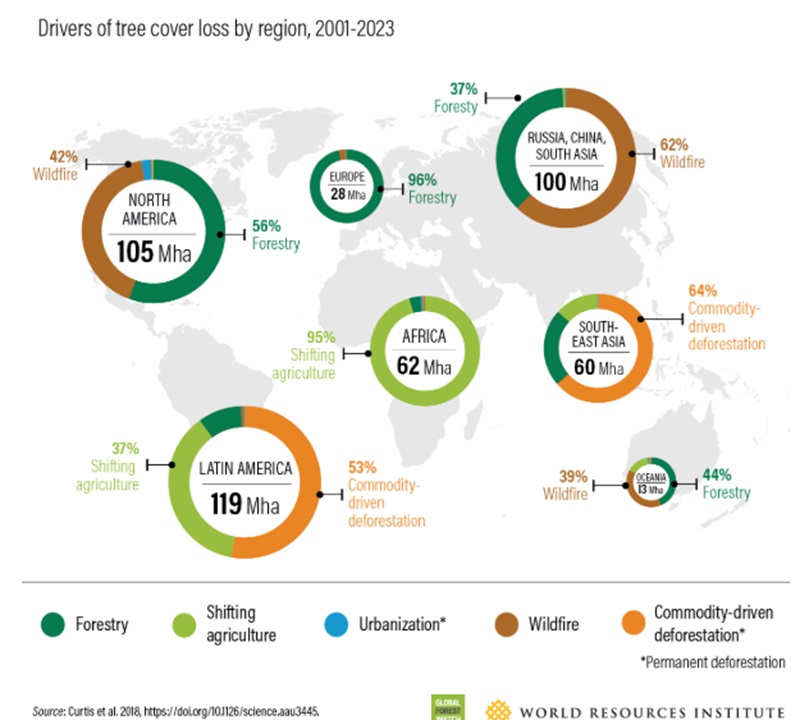Sikeade Egbuwalo is the biodiversity lead at Nigeria’s Federal Ministry of Environment.
Here in Nigeria, we are suffering badly from forest loss and degradation. We are losing our unique wild animals and plants and suffering from encroaching deserts, failing rainy seasons, declining wetlands and diminishing food supplies. Our Indigenous communities are struggling to survive on the land where they have sustainably lived for millennia.
To tackle this and preserve our forests, we are advancing policies to secure effective protection of 30% of the West African ECOWAS region by 2030.
But unfortunately, despite global commitments, this ambition is not shared around the world. International attention has focused almost entirely on tropical deforestation, allowing the wealthiest countries of the Global North to avoid accountability for impacts in their own forests.
This deeply rooted double standard now jeopardises the implementation of the ambition to halt and reverse forest loss and degradation by 2030, which was enshrined in a declaration at COP26 in 2021 and at COP28 last year.
Biodiversity market takes off at COP16, in shadow of carbon credit chaos
Boreal and temperate forests in the Global North are among the most ecologically vital ecosystems in the world. In addition to their importance for biodiversity, they store a significant share of the planet’s forest carbon, making them critical for the climate.
Yet primary and old-growth forests are being clear-cut at alarming rates in the Global North, where forestry is driving some of the highest rates of tree cover loss in the world. Like tropical deforestation, the impacts of northern logging do not stop at countries’ borders – they are felt everywhere.

World Resources Institute analysis of tree cover loss by region (2001-2023)
Despite the science, countries in the Global North continue to insist their practices are sustainable and are working to limit the forest discussion solely to deforestation and degradation of tropical forests in the Global South.
Just days following the 16th meeting of the Conference of the Parties to the Convention on Biological Diversity in Cali, Colombia, last month, policymakers from several countries in Europe attempted to effectively exempt their industries from the European Union Deforestation Regulation (EUDR) through a “no risk” category for countries with increasing forest cover.
While EU member states have fortunately held firm against these amendments, this is not the only attempt by Global North countries to weaken the EUDR’s application within their own borders.
Obstructionism under the EUDR is also only part of a broader effort by Global North countries to permit themselves to continue business-as-usual forestry practices without transparency or accountability, while putting the burden for improvement and due diligence solely on the Global South.
Failure of Busan talks exposes fossil fuel barrier to UN plastics pact
Not only does this inequity undermine progress on natural climate solutions in the Global North, it also places an additional burden on the Global South, prevents us from addressing this problem as true partners, and stunts the development of cohesive global supply chain standards.
As we move toward the latter half of this critical decade and look toward next year’s COP30 climate talks in Belém, Brazil, we must commit to a shared global responsibility for forest protection. This should increase ambition from tropical countries, but even more so address destructive forest practices in the Global North and – like we are doing in the tropics – build more sustainable, healthy supply chains.
Global equity framework
This is why I am extremely proud that, last year, in the African Ministerial Conference on the Environment’s declaration, African nations reached a consensus to support the development of a global forest accountability and equity framework. This is a means of driving global progress and promoting greater alignment between forest protection standards across tropical, temperate, and boreal forests.
The vision of Nigeria and the rest of Africa through the development of this framework is to ensure that the world truly unites and responds as one to protect our forests.
Our continent as a whole seeks, through this framework, to secure the development of enhanced and common reporting, monitoring and definitions to ensure global commitments to halt and reverse deforestation and forest degradation are implemented to the same standards within and outside the tropics.
We need to drive cooperation and collaboration across all forests. We encourage all countries to join us in this endeavor by supporting the development of an equity framework.
Nigeria just reiterated this important call for equity in Cali. The fight against forest loss and degradation is not a fight that should solely be tackled by the Global South. We are all affected by the harmful impacts of climate change, and losing or degrading tree cover anywhere in the world has dire consequences for everyone on the planet.
We cannot have a system that holds the wealthiest countries to a different standard. In the lead-up to next year’s COP30 summit in Belém, we urge all countries to come together as true partners to advance our shared commitments, working equitably and transparently to protect and restore the forests on which all our futures depend.
The post Global North countries must step up on protecting their own forests appeared first on Climate Home News.
